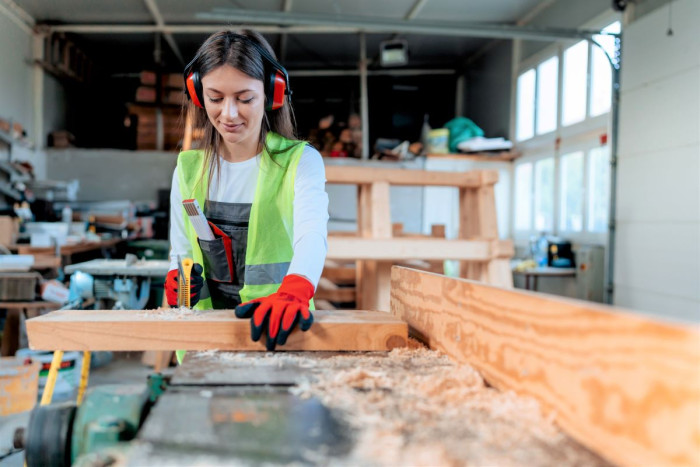Carpenter
Kaihanga Whare
Alternative titles for this job
Carpenters work mainly with wood to repair or install foundations, walls, roofs, windows and doors in buildings.
Pay
New carpenters usually earn
$24-$25 per hour
Experienced carpenters usually earn
$29-$41 per hour
Source: Seek and TradeMe, 2023.
Job opportunities
Pay
Pay for carpenters varies depending on skills, experience and where they work.
- Carpentry apprentices may start on the training minimum wage or minimum wage, with pay increasing as they gain skills and complete unit standards.
- Experienced carpenters, or those who have completed an apprenticeship, usually earn $29 to $41 an hour.
- Those running their own business may earn more than this, but their income depends on the success of the business.
Source: Seek, 2023; and TradeMe, 2023.
- PAYE.net.nz website - use this calculator to convert pay and salary information
- Employment New Zealand website - information about minimum wage rates
(This information is a guide only. Find out more about the sources of our pay information)
What you will do
Carpenters may do some or all of the following:
- study building plans and architectural drawings
- select building materials
- measure and cut materials to the right size and shape
- construct building frames and install cladding on the inside and outside of buildings
- install windows, staircases and doors
- renovate and do repair work on older houses.
Skills and knowledge
Carpenters need to have:
- building and carpentry skills
- knowledge of building methods and materials
- a basic level of maths
- skill interpreting drawings and architectural plans
- the ability to properly use and maintain tools
- an understanding of building and safety regulations.
Working conditions
Carpenters:
- usually work regular business hours, but may also work weekends
- work on building sites and in existing buildings
- work in conditions that may be wet, muddy, dusty, noisy, cramped or at height
- travel locally to building sites.
What's the job really like?
Unga Fonua
Carpenter
Follow the path that comes naturally
Unga’s interest in carpentry began as a young boy in Tonga. "It started off as a hobby. It was natural for me to fix bits and pieces and help build huts, and my cousins were all doing carpentry.
"Later, in New Zealand, I’d left school and was drifting, but came to a point where I realised I was wasting time. A church contact encouraged me to get a plumbing scholarship through Weltec’s Māori and Pasifika Trades Training (MPTT) scheme. I finished the plumbing course, but it made me realise I really wanted to do their carpentry course!"
Show employers your passion and it’ll open doors
Unga finished the MPTT pre-trade carpentry programme and was doing some labouring when he was told that work was finishing. "It took the announcement for me to find the courage to ask the leading hand if I could stay on and do a carpentry apprenticeship."
His newfound confidence paid off and Unga is now two years into his New Zealand Certificate in Carpentry studies. "At first I had to ask my mentor how to read plans and action them. Now I can understand plans I’ve never seen before."
Carpentry offers a toolkit of skills
Unga is currently working with a team of builders on the restoration of an historic public building. "Carpentry’s not just woodwork. I’m doing formwork – putting in steel foundations for concrete. But I want to get into the finishing work – the detail, the really fine woodwork."
Unga says he likes that building skills are transferable. "Wherever you go you can take your skills with you, and it also feels good to finish a job. It gets physical but it keeps you active and it’s good for your health!"
Carpenter video
Josh Fraser takls about life as a carpenter – 2 mins
transferable to your everyday life.
There's always something to do around the house,
and there's always friends and family needing help as well.
My name is Joshua Fraser and I'm a carpenter.
Basically, I construct houses,
starting with foundations all the way to framing and finishing the house off as
well. This is the ensuite,
and we're going to be framing out the shower recess. By looking at the
plan.
I've determined that our first stud needs to be 825 millimetres away
from the wall,
and that's where I've transferred these marks down for that stud right here.
One of my favourite things about my work is seeing the visual progress throughout
the week and really being able to construct something that's going to make a
difference in a family's lives.
So I've just measured my stud that I'm going to cut. I've marked that here,
and now I'm just setting everything up on the drop saw,
and now I'm just going to put my safety gear on and make the cut safely.
I didn't quite choose this career.
I really stumbled upon it. I came across an ad in my school that they were
looking for carpenters. I really liked being hands-on,
so I thought I'd give it a try, and 1 week later
I knew that it was a career that I really wanted to do.
This is my tool belt where I carry my daily tools and some of the essentials is
my hammer, my pencil, keep it nice and sharp, and the same goes for my chisel:
nice, sharp edge.
So the apprenticeship programme works through a course provider.
They'll give you bookwork to do as your theory work and there's also practical parts
you have to complete on site, and that gets signed off by your boss.
After 3 to 4 years,
you come out with a certificate in carpentry and that allows you to work as a
qualified builder and you can really just branch out from there.
Some advice that I would give to someone that's considering being a carpenter is just to give it a go.
Entry requirements
There are no specific requirements to become a carpenter as you gain skills on the job. However, many employers prefer to hire carpenters who have or are working towards a qualification.
To become a qualified carpenter you need to complete an apprenticeship and gain a New Zealand Certificate in Carpentry (Level 4).
The Building and Construction Industry Training Organisation (BCITO) oversees carpentry apprenticeships.
Experienced carpenters with no qualifications can ask BCITO to have their skills assessed and gain a New Zealand Certificate in Carpentry (Level 4).
A New Zealand Certificate in Carpentry can also be completed through carpentry apprenticeships with the New Zealand Army.
- BCITO website - carpenter apprenticeships
- BCITO website - getting your trade experience recognised
- Defence Careers website - carpentry apprenticeships with the NZ Army
- More information about apprenticeships
Secondary education
No specific secondary education is required for this job, but maths, construction and mechanical technologies, design and visual communication, English, and science to at least NCEA Level 2 are useful.
Year 11 and 12 learners can find out more about the construction industry, and gain relevant skills, by doing a National Certificate in Building, Construction and Allied Trades (Levels 1 and 2) through the BConstructive programme.
For Year 11, 12 and 13 learners, trades academies and the STAR and Gateway programmes are good ways to gain relevant experience and skills.
These programmes may help you gain an apprenticeship, but do not reduce the amount of time it takes to complete it.
Personal requirements
Carpenters need to be:
- accurate, efficient and organised
- adaptable
- comfortable working at heights and in confined spaces
- safety-conscious
- able to work well in a team and good at communicating
- able to follow instructions.
You need to be adaptable as a carpenter. You can be working on something, but then there’s a change of plan and you’re asked to redo it, or extra things need to be done.

Unga Fonua
Carpenter
Useful experience
Useful experience for carpenters includes:
- draughting
- woodwork
- labouring on a construction site
- any other building trade experience.
Physical requirements
- Carpenters need to be reasonably fit, healthy and strong, as building work can involve a lot of heavy lifting.
Registration
Some building work has to be carried out or overseen by a Licensed Building Practitioner. To get a licence, you have to prove your experience and/or have appropriate qualifications.
Find out more about training
- Building and Construction Industry Training Organisation (BCITO)
- 0800 422 486 - info@bcito.org.nz - www.bcito.org.nz
What are the chances of getting a job?
Growth in building work means good opportunities for carpenters
Chances of getting a job as a carpenter are good due to:
- moderate growth in construction predicted to extend until at least the end of 2023, meaning more building work
- the Government’s KiwiBuild programme, involving the building of quality affordable homes over the next decade
- building work needed to upgrade leaky homes and earthquake-prone buildings.
However, like many building jobs this role can be affected by economic conditions. A downturn in the economy can lower demand for carpenters.
Carpenter appears on Immigration New Zealand's regional and construction and infrastructure skill shortage lists. This means the Government is actively encouraging skilled carpenters from overseas to work in New Zealand.
According to the Census, 14,565 carpenters worked in New Zealand in 2018.
Record number of carpenter apprentices but demand still strong
The number of apprentice carpenters has grown steadily in recent years but there are still not enough qualified carpenters to meet demand.
You can increase your chances of getting a carpentry apprenticeship if you have:
- a good attitude to work, good time management skills, and are willing to learn
- completed a Gateway or pre-trade programme
- the ability to use hand and power tools, or operate a forklift
- experience in general carpentry, framing and repairs
- completed a tertiary qualification but want to retrain in carpentry.
Most carpenters work for large building companies or contractors
Carpenters usually work for builders or building firms. Many of these are smaller businesses, employing two to 10 people. Large building firms also employ carpenters, but often subcontract work out to mid-sized building companies.
Carpenters usually specialise in either residential or commercial building. Commercial building is dominated by larger companies, while most residential building is contracted to builders who employ only a few staff.
Sources
- Florence, G, chief executive, Certified Builders Association, careers.govt.nz interview, September 2018.
- Immigration New Zealand, 'Construction and Infrastructure Skill Shortage List', 27 May 2019, (www.immigration.govt.nz).
- Immigration New Zealand, 'Regional Skill Shortage List', 27 May 2019, (www.immigration.govt.nz).
- Ministry of Business, Innovation and Employment, 'National Construction Pipeline Report, 6th Edition, July 2018, accessed September 2018, (www.mbie.govt.nz).
- NZ Herald, 'Builders seek an extra 2000 apprentices a year with new app', 24 May 2018.
- Stats NZ, '2018 Census Data', 2019.
(This information is a guide only. Find out more about the sources of our job opportunities information)
Progression and specialisations
Experienced carpenters may progress to become self-employed or work as building contractors, or move into supervisory or management roles.
Carpenters may specialise in either commercial or residential carpentry.
Last updated 27 March 2025


